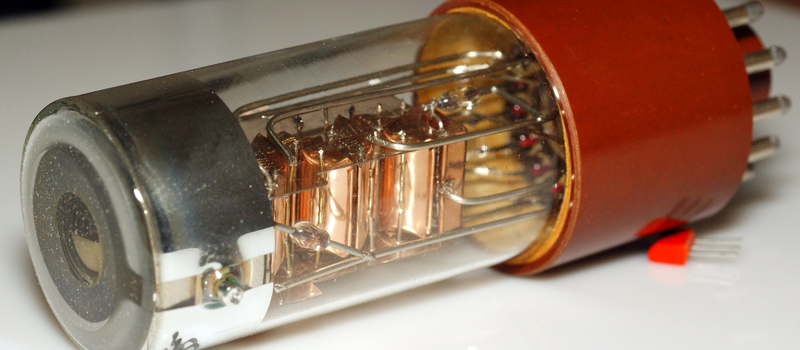On the heels of our post on retro-Soviet transistor teardowns and die-shots, [nikitas] wrote in to tell us about a huge thread on rare vacuum devices of all varieties: oddball cathode-ray tubes, obscure Nixies, and strange Soviet valves. We thought the other forum post was overwhelming at just over 110 pages, but how about 391 pages (and counting) of blown-glass electronics?
If you read through the decaptholon, we mentioned that a particularly enthusiastic poster, [lalka], looked to be cataloguing every Soviet oscillator circuit. It turns out that he’s also the one behind this incredible (random) compendium of everything that’s had the air sucked out of it.
We don’t know what it is about tubes, but Nixie clocks are cooler than other clocks, and VFDs are cooler than LCDs. Maybe it’s because they embody so much more obvious human effort? They’re fundamentally simpler, visible devices? Or maybe it’s just because they glow purty. Anyway, we’re drawn to them. We’ve written up hand-blowing your own vacuum tubes like a pro, and a distinctly less tech approach with aluminum foil, and everything in between.
Thanks [nikitas] for the tip! You and [lalka], keep up the good decapping work.

















There are some really weird VFD tubes on there. Great find!
“We don’t know what it is about tubes, but Nixie clocks are cooler than other clocks, and VFDs are cooler than LCDs. ”
Agreed. :D
For anyone who needs it…
http://itools.com/tool/google-translate-web-page-translator
LCD’s are coller, Nixies or VFD are definitely hotter. :-)
…cooler…
I think it would be really good if there were an article about how valve tech actually works. The math is amazingly simple and it still has applications in use today. Valve technology is often considered as a aspect of history. Sure, other technologies have overtaken consumer markets but some non-consumer applicators remain dominated by valves because no cost effective alternative exists.
+1 that would be great, I have no idea how a valve works.
I ‘d like to say, being able to comment on Hackaday but not being able to use Wikipedia leaves me puzzled.
I just had a read around wikipedia and couldn’t find anything that explains how a valve actually works in terms that an EE would expect.
I had to do all the math etc ‘back in the day’ but I have forgotten most of it now. I do however still know the basics of how to get a valve working properly but I don’t remember enough to go from formulas to physical dimensions or vise versa.
If there is some info that you were specifically referring to then then please leave a link.
Agreed [Annie]. I didn’t want to mention magnetrons as the valve technology isn’t immediately visible and deconstructing that technology has safety hazards.
I was more thinking of X-RAY technology and high powered RF transmitters.
There is an excellent video on YouTube showing a behind the scenes look at an old analog TV transmitter here in Australia and that used a fairly beefy valve as the primary amplifier for the final video output. No idea what its modern digital TV replacement is using…
Tubes are still king for high output needs, transistors are nice but the current requirements are cost-prohibitive and a transistor final array on the order of a megawatt would be an engineering nightmare..
Thermionic emission is the principle of a vacuum tube’s operation..
The blogger should be decapped for not proofreading his glow purty
I’m 99% sure the use of “purty” was intentional. Let’s save the decapping for the electronics.
I’m 99.9% sure.
Not 100% sure?
f(n){
static n;
n = n * 1.01;
return f(n);
}
Are you in the “purdy” camp instead?
English-speakers erroneously tend to call everything Soviet “Russian”.
But Soviet electronics was produced NOT ONLY in Russia, but also in Ukraine, Belarus, Armenia, Azerbaijan, Georgia, Lithuania, Latvia, Estonia, Kyrgyzstan, Uzbekistan, Moldova.
http://rel.by/docs/logotype/177.html
Moreover, people from those republics worked on Russian factories and vice-versa.
– It’s pretty much like calling British computers “English computers”…
It’s pretty rare that I see hot russian tubes on the same page as pictures of children and don’t immediately clear my history and cache.
This site doesn’t always get Geo-location information correct all the time and that is predominately because they’re American lol.
But I would like to mention some articles about the location you mention.
http://hackaday.com/2015/04/13/peripherals-behind-the-iron-curtain/
http://hackaday.com/2014/12/15/home-computers-behind-the-iron-curtain/
I would love to hear more about your memories.
Surely there’s a working flux capacitor amongst all that awesomeness.
In my youth, it took me 15 years of ignoring vacuum tubes to realise that some of them are functionally equvalent to simple analog semiconductor ICs. In some cases representing more elegant solutions than the same functionality wrought in transistors. I would hazard a guess that in some situations when power requirements mean huge PSUs in either case, the tube version could even be more compact.
I think what started to clue me in was a matchbox size AM radio design using a mil surplus rugged tube of approx 2/3 AA size that did RF detection amplification and 2 stages of audio amp, basically only needing the tuning circuit and power source.
I think we might revisit the Russian expertise in high power tubes in future sometime, when we need brute force instead of subtlety.
We don’t have to revisit anything Russian. High power tubes are very much already here and have been here and have been used and are being used and will be used well into the future. People see a technology disappear from consumer electronics and see smart phones and computers in their pockets and jump to the conclusion that older technology must be long dead and buried… Not all the case. Every time you get an x-ray at the hospital, that’s a vacuum tube… Every time someone gets radiation therapy for cancer, from any number of devices, x-ray, cyclotrons, etc,, there are vacuum tubes, every time you fly on a plane, the ground radar tracking you has a vacuum tube at its heart. microwave back-haul systems, MICROWAVE OVENS!, wood drying kilns at lumber mills… the list goes on and on.
And BTW, that Eimac tube that the toddler is climbing on is an American tube. I think its actually the water jacket and socket for a tube that sits inside. Probably cooled with dielectric oil or DI water, depending on the application and wattage of the actual tube, maybe a 100,000W tube being pushed to something over that by simply removing more heat with a huge water jacket or perhaps running at a voltage over what the tube would normally operate at on its own without a mineral oil bath.
But they make versions of tubes that have a water jacket like that as part of the tube itself, still very much being built right here in the USA… And they probably still make the tube that goes into that jacket….
Guess I’m underinformed, probably based on a potentially underinformed piece I read somewhere else ages ago, saying something like that the search radar on Mig 25s was so powerful it was practically a beam weapon (Well, within feet of it) , and US equivalent output radars only went on ships and took more 10x room. Meanwhile US radars getting more out of less power by more sophistication, better processing etc… Anyway, that gave me impression that power density of Russian tubes was better than US tubes (Knowing that those shipboard radars would still be using them.)
Russian aircrafts are forbidden to switch on the radar while on the ground. During soviet times in remote bases, the military guys used to point the aircraft to nowhere (some field), switch on the radar, let it run for 10 minutes, then switch off and went search for dizzy/cooked rabbits caught in the open during the process.
You went too far, yes tubes are used, no not in all the situations you picture in your post. Even the ones you weren’t joking about.
Yep, I have a high voltage power supply that uses a Eimac 4CX15000A and it is not that old.
Not to mention the breed of tubes that have no fillament or heater, such as photomultiplier tubes. The only project I ever built that had a vaccum tube, bunch of transistors and a microcontroller.
Elliot, HAD is a great resource but due to much of the content referencing linked pages it is vulnerable to bit-rot, however there is a simple way to fix this, just submit linked pages to https://web.archive.org/save/%5Byour URL here]
I am sure you could knock up a script to do it for you automatically for each external link on new HAD pages too.
https://web.archive.org/save/ [your URL here]
If you specifically save a page, does it persist even if the domain lapses then gets bought up for residuals with a robots.txt forbidding crawls and indexing??? That’s my pet peeve, people who never owned the content of a previous site blocking access through their robots.txt when they buy the domain.
It is a time based snap-shot therefore what the site hosts now has no effect on what was archived in the past. If you have any demonstrable concerns take them up with the people at archive.org
Just a note of caution, never photograph a photomultiplier tube like the picture in the column with a flash, even non-energized there can be enough current generated in the tube to damage it and lower it’s sensitivity. They should also be stored dark or with a black cover over the business end.